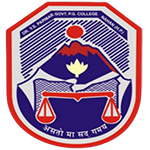Programme Outcome
I. BACHELOR OF ARTS (B.A.)
Individuals who opt to pursue a BA Degree are presented with a wide array of subjects to select from, encompassing History, Political Science, Geography, Sociology, Psychology, and Art, to name but a few, in addition to compulsory subjects such as Hindi, English, and Environmental Science. They gain an understanding of an integrative, multidisciplinary, and experimental approach to the study of how humans, animals, and machines process information.
The ongoing BA programme has undergone a significant paradigm shift in its approach and perspective, transitioning from a purely cognitive focus to one that positions employability at the very core of its objectives. As a result, each subject within the program now incorporates Skill Enhancement Courses to augment its value. These skill enhancement courses render students’ skills marketable, equipping them well for a rewarding professional future.
Rather than approaching education primarily from a theoretical standpoint, the program now extends practical support to its students, aiding them in not only identifying avenues to apply their knowledge but also in seeking employment and livelihood.
Outcomes of the BA Programme:
I. Cognitive Skills: Our students, while studying a combination of subjects offered by the institution, cultivate a sharp awareness of our country’s history, society, culture, and political legacy. The program aids in making our students aware of our sociological, cultural, and religious diversity and harmony. The cognitive skills acquired, therefore, help students develop perspectives on contemporary society, both locally and globally.
II. Employability Skills: Employability remains at the very core of the program. Upon completing the degree, our students become eligible for employment in fields such as journalism, hospitality, law, advertising, theater, education, tourism, horticulture, and various other industries. The program emphasizes the development of reading, writing, and comprehension skills, making students well-prepared and eligible for positions in both government and non-government sectors. A comprehensive study of various subjects equips them to compete in various employment examinations after graduation.
III. Affective and Behavioral Values: Humanities play a significant role in instilling values in our students. They are highly conscious of the environment, hygiene, and other aspects of social responsibility. Engaging in various activities throughout the three-year program, be they social, religious, political, or cultural, helps shape individuals who comprehend and appreciate religious and cultural diversity and pluralism.
The interdisciplinary nature of the courseware allows you to explore a wide variety of perspectives. Students interested in Arts and Humanities can delve into understanding how the human brain shapes creativity.
II. BACHELOR OF COMMERCE (B.COM)
The Department of Commerce was established in 1997-98 and has been scaling heights ever since. The Department offers a Bachelor of Commerce degree under the Choice Based Credit System (CBCS), one of the most demanded courses in the contemporary academic world. The students have added to its prestige by securing university ranks and high-level placements. Highly professional in nature, the course aims to provide a foundation for students planning to pursue careers in business, commerce, accounting, and related fields. We also encourage students to organize events such as National Seminars, inter-college and inter-departmental meetings, participate in events organized by other colleges, and engage in activities of social relevance. They are enabled to think creatively and develop the right mindset to meet the challenges of the globalized business environment, through value-based education, interpersonal relations, and outreach programs. The department also has a functional subject society known as the “Commerce Subject Society,” with a subject teacher as its president and a student from the final year as the vice-president. The faculty of the department consistently encourages students to participate in sports, NSS, NCC, and other extracurricular activities. With all these inputs, one finds our students hardworking, practical-oriented, and effective in any work environment. The curriculum is taught by a distinguished faculty combining academic excellence and real-world experience with dedication and commitment. The department has adopted and effectively utilizes Information Communication Technology (ICT) in teaching techniques.
The outcomes can be precisely explained as:
PO – 1: After completing three years of the Bachelor’s in Commerce (B.Com) program, students will have gained a thorough grounding in the fundamentals of Commerce and Finance.
PO – 2: The commerce and finance-focused curriculum offers various specializations and practical exposures that equip students to face modern-day challenges in commerce and business.
PO -3 The all-encompassing outlook of the course offers a range of value-based and job-oriented courses, ensuring that students are trained for contemporary demands. In advanced accounting courses beyond the introductory level, affective development will also progress to the valuing and organizational levels.
III. BACHELOR OF SCIENCE (B.SC.)
Bachelor of Science (B.Sc.) provides both theoretical and practical knowledge across different subject areas, including Physics, Chemistry, Mathematics, Botany, and Zoology. This program is highly beneficial for students with a strong interest in Science and those aspiring to pursue interdisciplinary science careers in the future.
The program outcomes include:
• Comprehensive understanding of basic concepts, fundamental principles, and scientific theories related to various scientific phenomena and their relevance in everyday life.
• Acquisition of skills in handling scientific instruments, planning and conducting laboratory experiments, fostering a scientific temper, and contributing to societal and national growth.
• Opportunities for higher studies, such as M.Sc., M.Phil., Ph.D., etc., and engagement in research that can inform policy-making and benefit humanity.
• Development of observational skills, logical inference drawing from scientific experiments, critical analysis of scientific data, and potential roles as scientists serving the nation.
• Diverse career opportunities, including service in the armed forces (Indian Army, Navy, Air Force), civil services (IAS, IFS, IRS), industries, multinational corporations, and entrepreneurship.
• Versatile preparation for recruitment in various sectors and the ability to serve society through scientific contributions.
